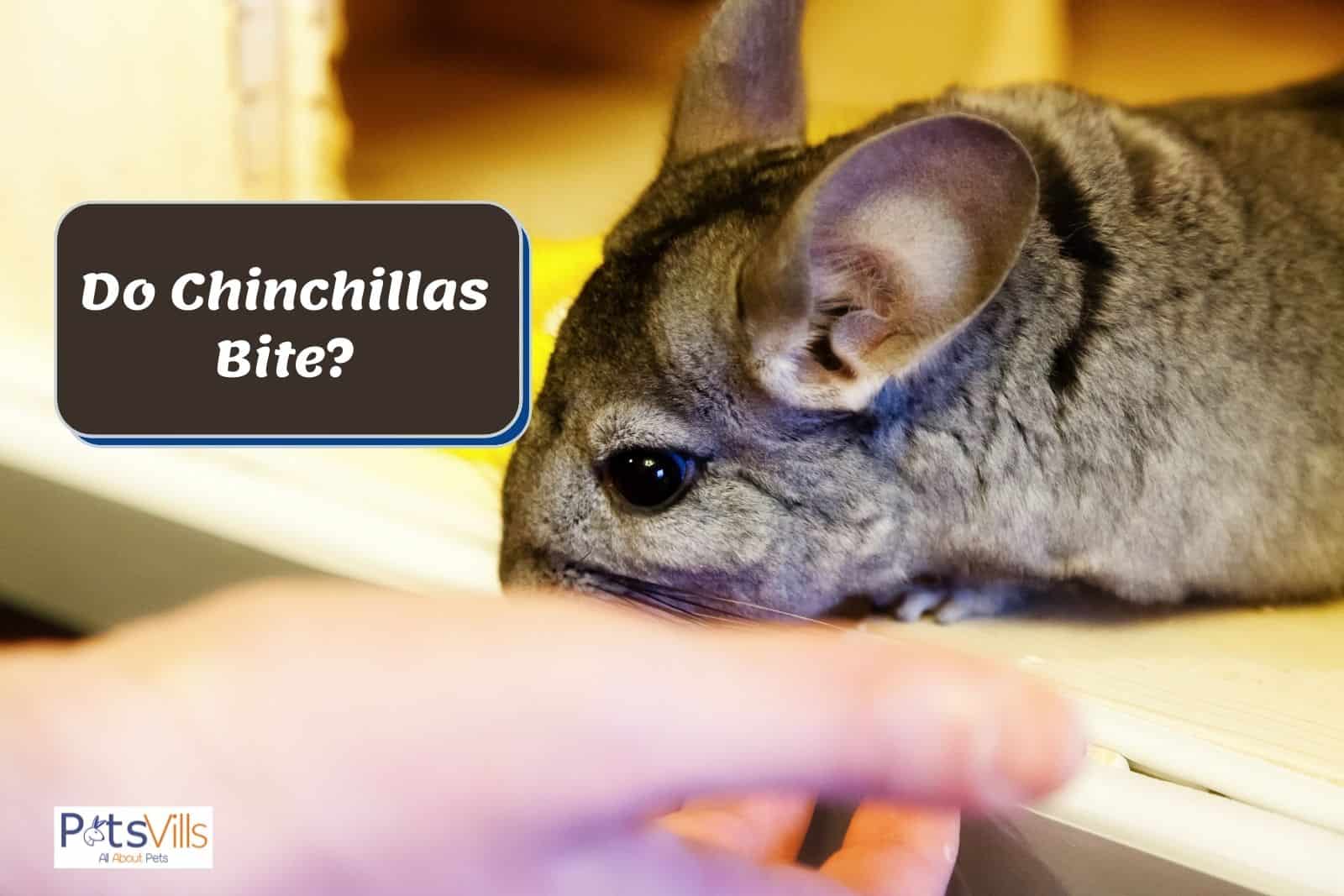Chinchillas have long front teeth that are constantly growing during their adolescent and adult life.
It is important to supply your chinchilla with lots of hay and grass-based pellet to make sure their teeth don’t overgrow.
Do Chinchillas Bite?
Yes, chinchillas can bite but it’s uncommon unless they are being threatened and is often their last resort. Younger chinchillas are more likely to bite since they haven’t been tamed or trained yet.
If chinchillas were to bite they could do some harm, but do chinchillas actually bite humans that often?
READ MORE: Do Chinchillas Make Noise?
Table of Contents
Do Chinchillas Bite?
Chinchillas only really bite when they are scared, stressed, or in an environment that they aren’t familiar with.
When you first get a chinchilla the likelihood of them biting you is much higher as it hasn’t gotten to know you yet. Especially if you try to pick them up and cuddle them.
To prevent your chinchilla from biting you, make sure their cage is big enough and has areas to escape so it doesn’t feel trapped. Try to create an environment where your chinchilla feels relaxed.
This will make your chinchilla feel at ease and less likely to bite you.
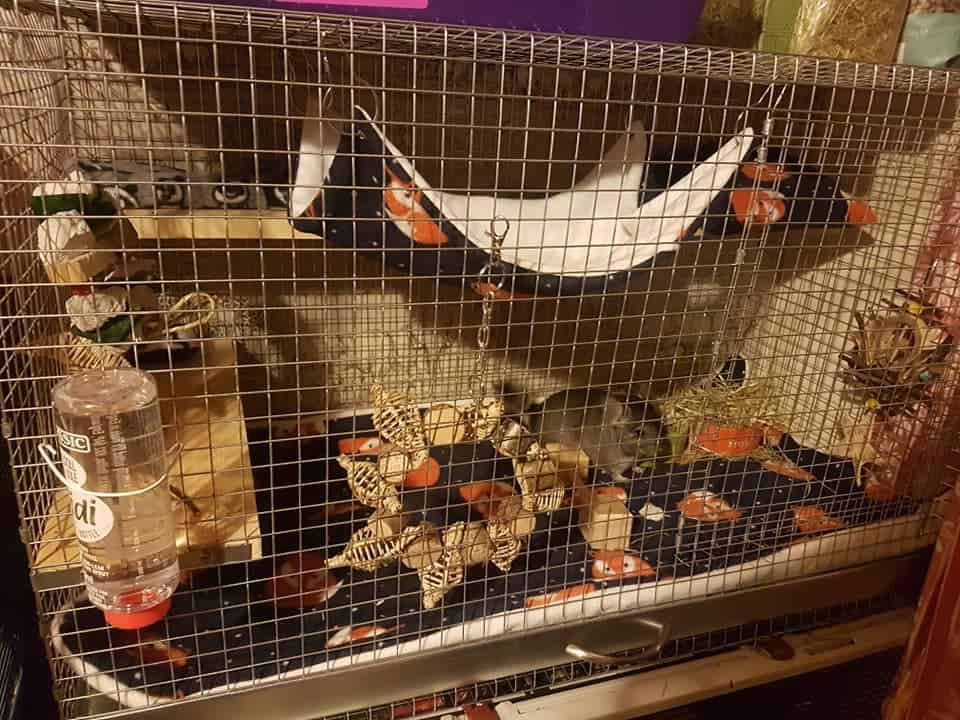
Generally, chinchillas are friendly animals. Some chinchillas will like to nibble your hand and fingers but it doesn’t usually do any harm or hurt. This is different from biting you.
The cage in the image on the right is a good representation of a good living condition for a chinchilla.
It is spacious, has food, a constant supply of water, and platforms for the chinchilla to jump off and run around for exercise.
It would be a good idea to give your chinchilla an exercise wheel too and make sure that your cage is large and tall enough.
You need to make sure the exercise wheel is big enough and isn’t made out of metal wiring as some chinchillas have broken their feet in them.
READ MORE: What Can Chinchillas Chew On?
How to Train Your Chinchilla to Stop Biting You
The best way to avoid a chinchilla bite is to make sure to handle your chinchilla correctly. Taming and socializing with your chinchilla from a young age will tame it and prevent them from biting you and other people in the future.
Chinchillas typically live for 15 – 20 years old and biting is more common in younger chinchillas.
If you handled your chinchilla correctly, it is unlikely to bite you unless you have provoked or scared it.
A good way to teach your chinchilla to stop biting you is by generally tapping its nose and saying ‘no’ when they go to bite.
Most of the time a chinchilla will just nibble and it won’t be hard or painful to the point that it draws blood.
Check out this great video:
Make sure you continue this behavior over an extended amount of time until it has stopped biting you. If you were to stop or only do it a couple of times, your chinchilla may carry on to bite.
Offer your chinchilla treats regularly to show them you aren’t going to hurt them and to help gain your trust. This will help keep your chinchilla calm and to recognize that you aren’t a threat.
You should also allow your chinchilla to smell you before you go to groom or handle them. This way they will get familiar with your smell and know who you are.
Check: Do Chinchillas Run in a Ball?
The Steps You Should Take if Your Chinchilla Bites You
If the bite is severe, hand the animal to another person or carefully put your chinchilla back into their cage and treat your hand immediately.
The most important thing to remember is to stay calm. You don’t want to stress out or frighten your chinchilla anymore than you have to.
Just like the steps that are mentioned above and in the video, if your chinchilla goes to bite you, gently and lightly tap them on the nose and say the word “No”. If you do this often, it will stop biting in a matter of days or weeks.
More importantly, do not chase a chinchilla around its cage, as this might cause it to panic and compel it to bite.
Use a Pair of Leather Gloves
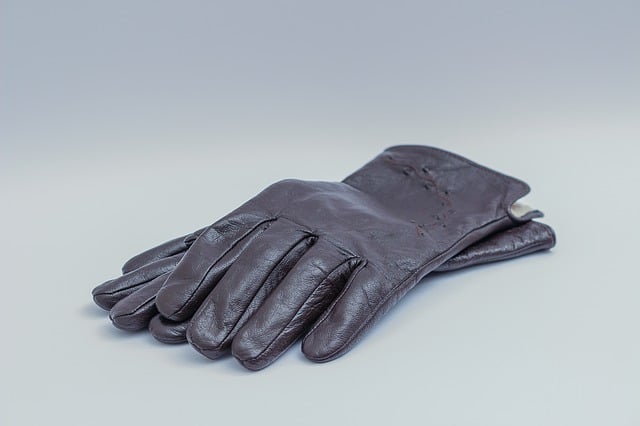 If your chinchilla carries on to bite, it might be a good idea to wear a pair of leather gloves.
If your chinchilla carries on to bite, it might be a good idea to wear a pair of leather gloves.
Leather gloves can help protect your hands and arms from a chinchilla bite, and therefore reduce the harm it causes you.
Some breeds don’t recommend leather gloves as chinchillas might mistake them as a chew toy.
Grooming is Different Than Biting!
Now and then chinchillas will like to gently nibble your hands, arms, or fingers. This is called grooming and is quite common behavior between two chinchillas.
What usually happens is that one chinchilla will groom another chinchilla for a minute or two and then they will swap over and trade back and forth.
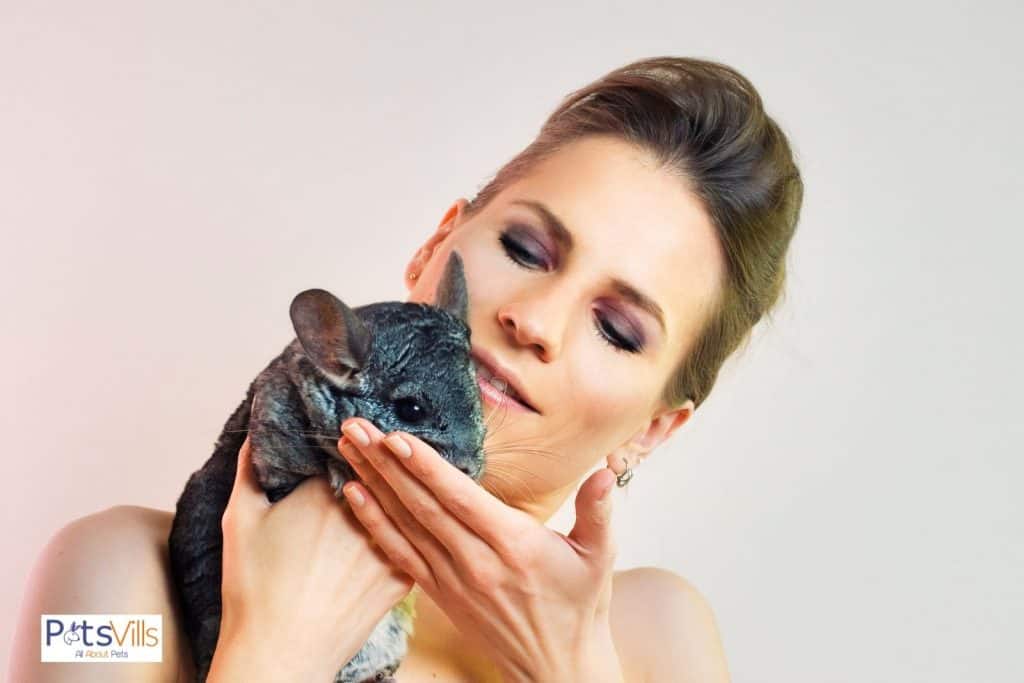
If your chinchilla starts to gently nibble you, you shouldn’t be overly concerned. This is normal for pet chinchillas.
If your chinchilla nibbles you and stops it is a sign that he is wanting you to return the favor. This is your term to give him some affection.
Try scratching your chinchilla gently between the paws, neck, around the face, or under the chinchilla.
Keep Your Chinchilla Away From Other Animals
You should make sure to keep your chinchilla away from other animals that are not chinchillas. They may frighten or scare your chinchilla that could result in your chinchilla being more likely to bite.
To help reduce the stress you want to make sure your chinchilla’s environment is as calm and chilled as possible.
Keep Animals such as cats and dogs away as they can frighten your chinchilla.
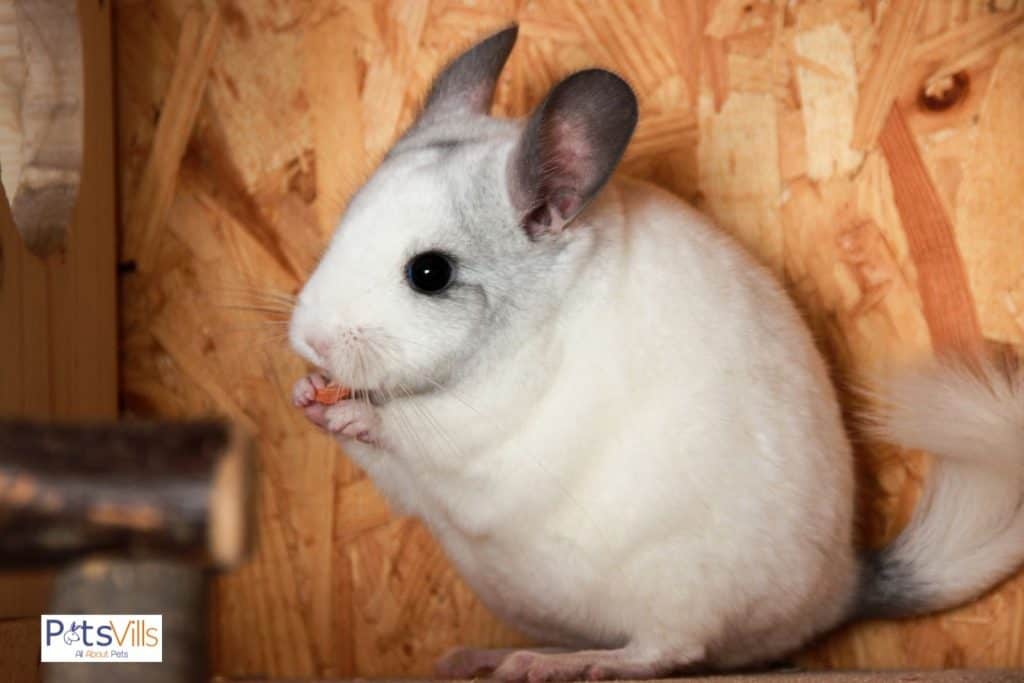
Chinchillas are prey animals and can become extremely stressed out when they are in close proximity to other pets, animals, and predators. In the wild, they hide under rocks to escape predators.
Gaining the Trust of Your Chinchilla
Gaining the trust of your chinchilla is important. A chinchilla that doesn’t trust you will be on edge and is more likely to bite you or become frightened.
There are many ways you can gain the trust of your chinchilla.
First, you need to help your chinchilla get used to your scent.
Try putting your hand or fingers inside of its cage. Try not to invade the chinchilla’s space, but leaving it there for some time can let your chinchilla get used to your scent and let the chinchilla sniff you out.
Be gentle when you’re doing this as any quick gestures or motions can frighten the chinchilla. This may result in them biting you.
You should wait for your chinchilla to come to you. Don’t chase them when they are in or out of the cage. This can frighten your chinchilla.
You should let them out of the cage daily so they can get used to the environment. Chinchillas, just like humans, can get bored easily.
Letting them out of the cage can also mean you can spend some valuable time with your chinchilla where you can bond with them.
Doing this often will put your chinchilla at ease and is a great way to let them know they are in a safe, calm environment where they don’t have to be frightened.
You can also give your chinchilla treats and is a great way to tame your pet.
The Dos and Don’ts When Dealing With Chinchillas
Chinchillas love to chew. If you allow your chinchilla to run around the house freely, it is likely it will eventually chew on your furniture.
This can be dangerous for chinchillas as they could be exposed to toxins that are in your home. Make sure anything that could harm your chinchilla is out of reach.
Keep plastic gadgets away from chinchillas; they might easily ingest them.
Chinchillas love to hide and destroy cardboard boxes. They also like to chill on ledge shelves. It is important to keep your chinchilla busy.
You can do this by placing objects in their cage. Objects such as an activity wheel or a chew treat toy can be a great way to make sure your chinchilla is healthy.
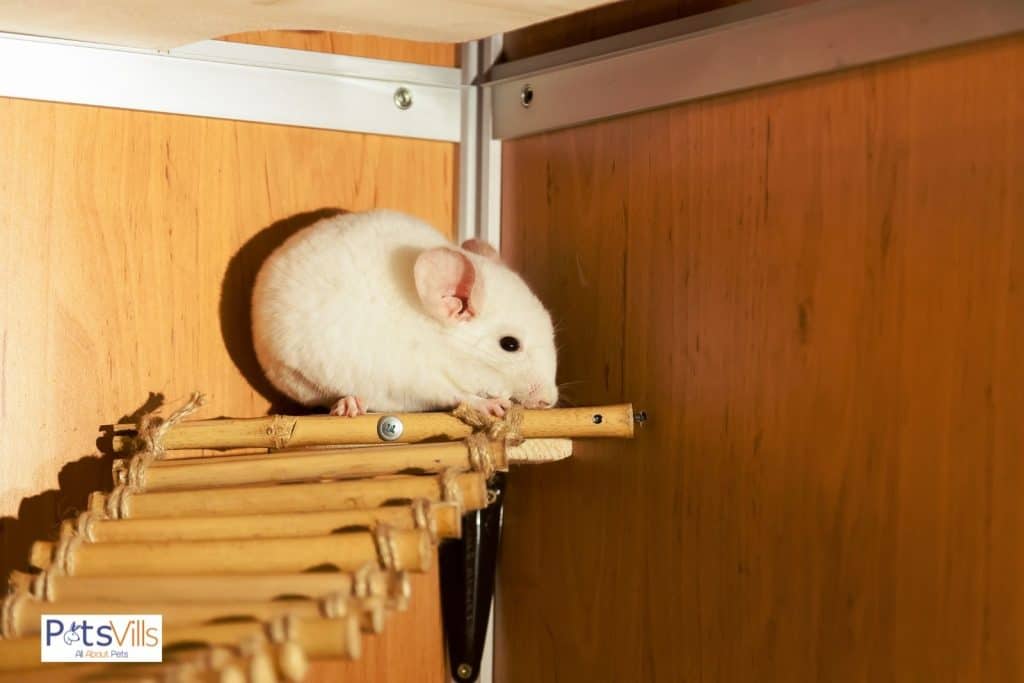
The floor of the cage should be strong and never wired. The wired-floor cage can cause arthritis. Instead, install corncob or pine shaving flooring.
Chinchillas don’t cope well with cedar chips. While the cedar smells nice, it contains toxic chemicals.
Although Chinchillas don’t smell as much as other rodents such as hamsters or rabbits, It is best to clean the cage at least twice a week.
Position the cage away from direct sunlight. Chinchillas don’t cope well in hot temperate as they cannot sweat or regular their temperate so they are prone to overheating.
Make sure your chinchilla has access to freshwater from a water bottle with a sipper tube. It is advisable to install metal shielding for plastic bottles because chinchillas love to chew plastic materials.
Chinchillas tend to gnaw because they have teeth that continuously grow throughout their life. Gnawing helps the rodent wear down the teeth.
Adding different objects in the cage that the pet can chew on is fairly important. You can find treats and other objects at pet stores or online that your chinchilla can chew on.
Related: Do Chinchillas Smell Bad?
Discover the reasons behind chinchillas chewing on their cages and learn effective strategies to curb this behavior in our video, “Why Do Chinchillas Chew on Their Cage & How to Stop Them!”
FAQs
Where do chinchillas come from?
Chinchillas first originated from the Andes Mountains, in South America. The mountains are filled with rocks of all types, where rodents find a suitable shelter to hide from predators.
Do chinchillas cuddle?

Chinchillas are not lap-oriented pets but once in a while, they may snuggle up to you and enjoy being cuddled.
How much room do fully-sized chinchillas need?
The perfect cage size for adult chinchillas is 3 x 2 x 2 feet. Make sure the cage has a minimum of 2 square feet of floor space per chinchilla.
References
- Bradford, Alina. 2014. “Chinchilla Facts.” Livescience.com. Live Science. July 21, 2014. https://www.livescience.com/28131-chinchillas.html.
- PetMD Editorial. 2017a. “Overgrown Teeth and Dental Issues in Chinchillas.” Petmd.com. PetMD. September 8, 2017. https://www.petmd.com/exotic/conditions/mouth/overgrown-teeth-and-dental-issues-chinchillas.
- ———. 2017b. “Common Illnesses in Chinchillas.” Petmd.com. PetMD. December 21, 2017. https://www.petmd.com/exotic/care/common-illnesses-chinchillas.
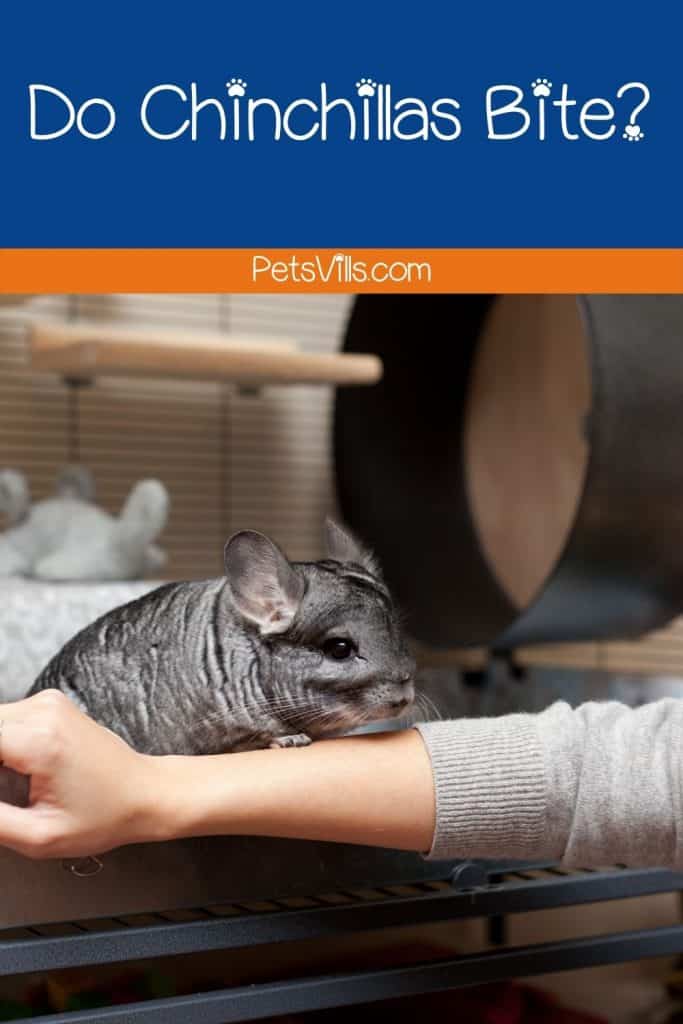
Have you experienced biting by a chinchilla? Let us know in the comments below!
Alina Hartley is a small-town girl with a ginormous love of bearded dragons. It all started with Winchester, a baby bearded who was abandoned at the shelter by his former owners because of a birth defect that caused one front leg to be shorter than the other. Alina originally went to the shelter looking for a guinea pig, but one look at Winchester and it was love at first sight. From that day on, Alina has dedicated her life to learning everything she can about bearded dragons. She loves helping new beardie parents start their incredible journey with these magnificent reptiles.
Follow her on:
LINKEDIN
TWITTER.
Read her latest articles HERE
Learn more about her HERE.

